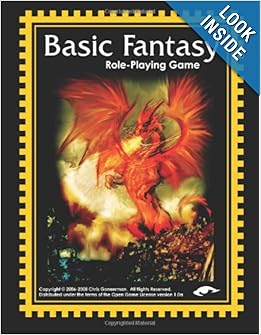 |
| Image used under a Creative Commons license:Image Link |
I know I haven't been posting up these articles here like I said I would, but I was just busy. I'm hoping to get to them (in reverse order) over the following weeks.
Also, it's worth noting that I'm no longer a columnist on En World, so if miss the columns there, then feel free to bug the management to rehire me.
You can find all the old columns right away in the archived pages on the En World's column page. I think mine go back all the way to the first page.
***
Most GMs, at some point in their illustrious careers, will have to design a village. What at first appears to be a ridiculously easy task will, on closer inspection, turn out to ‘be’ a ridiculously easy task. In case you’re designing your village at 2 a.m. and can’t think straight, there’s always this handy guide to help you remember if you missed something.
1. Reason for Existing
Thanks to @Hand of Evil for this fine idea.
First off, it would make great sense to figure out why someone would build a village here in the first place. Is it at a location of rich natural abundance? Is it near good farmland? Is there a mine or other interesting locale around?
Most villages aren't just built somewhere for no reason. Even if the reason is just that the village is along a trade route or houses the families of the men who man the wall. The reason the village exists can even help you to figure out a name for the village.
2. Name the Village
The most important part of creating a village is the name. If you’re too lazy to bother with naming the village, then you might as well do what the rest of us GMs do and just make everything up as you go along. If you have the skill to do this, you most definitely don’t need this article in the least. You can probably only use it as some mild amusement as to the crazy antics that lesser GMs get up to. “Ha, the guy needs a whole guide just to create one simple village? I can do that in ten seconds. It’s a village and it’s got a pub. There, took me two seconds.”
The first problem you’re run into when creating a name for a village is that your handy name generator just gives you character names and it would be really weird if the village were named “Bilbo” or “Bobby McGuire.” If you’re particularly creative, you might take the time to actually write down a secret page of village/location names. Then all you have to do is pick and choose or roll your dice. Rolling your dice is probably the better option as it will scare the pants off the players.
Regardless, you’ll still have to come up with some good village names sooner or later. If you actually coordinate the village names in your kingdoms, then you’re way ahead of the game. So far ahead, in fact, that the players probably won’t even notice your effort. No, what we’re aiming for here is a name that won’t immediately be ridiculed such as “Dell, Cheerios, or Hamburger.”
Designing this interesting, unique, and yet not-too-complicated name will require some effort. Probably about 5 seconds worth, actually. Try to think up something random sounding and vaguely foreign. Then try to pronounce it properly under your breath and see if it sounds completely ludicrous or inappropriate. If it passes this test, you have your village name.
Good village names: Castle-bar, Clover-down, Ixtiwickthick-o.
Bad village names: Jonathan, Nike, Free75, Google.
3. Determine the Location of the Village
The second most important thing is to figure out exactly where the village is in relation to everything else. The best way to do this is to create a map of the campaign. This is a single blank piece of paper. On this map, create a small dot or something better if you’re feeling artistic. I can usually handle a tiny picture of a house which looks like what an 8-year-old would draw in techni-color with crayons. In the map legend, or directly under this icon, place the name of the village in some kind of legible way. If you scrawl it too tiny, the village name might change all the time.
If you don’t have a map, or you don’t have time to add the village to the map, just use vagueness as your friend. “The village is somewhere to the east of the center of the world. That’s all you know.” Unless the party has complex magic or mapping tools at their disposal, you should be able to get away with this. After all, Google Maps hasn’t been invented yet, right? One more reason fantasy campaigns can be easier to run than sci-fi ones. However, “You’re lost in space,” is a great line, too.
Using vagueness, you can then later fill in an arbitrary location for the village when it suits you. Also, you can subtly reposition it to strand the party in the middle of an inescapable desert.
4. Points of Interest
Good villages will have at least one point of interest, and some will have several or more. Sometimes you can create an interesting village with no particular points of interest. Especially if you don’t want the party to waste 3 hours shopping around and talking to locales when they could be getting eaten by a bear in the wilderness or falling down deep pits in the dungeon.
Points of interest can be just about anything. So long as they’re interesting—they qualify. Usually, these points of interest are static locations, but they can also move around or be hidden. A thieves’ guild, a town hall, a local pub, a smithy, a stable, a general store, a healing temple, a wizard’s tower, a fortification, and more can all be points of interest. These locations all share one thing in common: they are places the players will be drawn to at some point. These are the places in the village where things happen. Even a haunted farm can be a point of interest.
Good points of interest often have a benefit to the players. If it’s where the power is, the players will want to discuss things with the village leaders. This could be missions, pay, problems, pleas, or anything else the players want to get done.
A guard-station would be a source of aid to the players, or where they end up repeatedly for breaking the law. A healing temple would be frequented for obvious reasons. Magical aid is in high demand, so any kind of wizard’s academy or tower will be a point of interest. Shops and markets also make good points of interest because the players need to buy supplies and equipment. If there’s some place the players can compete in challenges or tournaments, this would also be a good point of interest.
You can even create more specialized points of interest with a little work. It could be that all major deals go down behind a certain bakery. Maybe the thieves control the town from the basements the town was built on. Perhaps a local monster holds the village elders under its power and lives in a pile of pig defecation. Your options are practically limitless. Just remember to make sure the point of interest has something of value to the players in it. Otherwise, they might never discover your cool creation, or might ignore it completely.
5. Key People
Very similar to points of interest, there can also be several key people in the village. These people will either hold a lot of power, be interesting personalities, or hold some agenda influencing the adventure.
Some examples of key people are: the mayor, the local baron, the guard captain, the wizard, the high priest, the witch, the merchant, or anyone else the players will have reason to deal with. Obviously, anyone who holds a great deal of power or a high position could potentially be of great interest to the players. The local judge might be physically and mentally weak, but if he controls the law of the land he can be a very important person to know.
Some people might not hold any power, influence, or goods—but could still be of great interest to the players. A mad hermit, a village fool, a beggar, a crazy man, a funny farmer, a wandering minstrel, or a lost knight. All of these people could be great NPCs.
On occasion you won’t have key people written up for your village. Other times, the players might gravitate towards someone you hadn’t planned to be special. Don’t let that stop you. Create a name and quick personality for that key person and develop him or her. The barkeeper could suddenly become a very important person to the players, as could a random peasant, or a little girl. Provided they want to role-play with this character, many bit characters can quickly gain much larger parts. Some players are also fond of recruiting NPCs even if those NPCs don’t seem to have any special skills or abilities to begin with. It’s up to the GM to further develop those characters.
6. Adventure
A good village also has several locations which might be the basis for adventures or interesting encounters. Not every village need be filled with intrigues and monsters, but some can certainly make for great adventures. Always remember that you don’t need to confine your adventures only to the dungeons and the wilderness. The amount of adventure you can pack into a small village is only limited by your creativity and imagination.
Sometimes the players just want to rest and heal in the village. That’s okay. You don’t need to have the inn constantly attacked by savage monsters.
It’s a good policy to know where the local dungeons are situated, strange magical wastelands, haunted forests, and so forth. You don’t have to have every landmark filled with monsters, but merely hinting at supposedly haunted castles will quickly put the players on edge.
7. Special Events and Quirks
Thanks to +Robert Bondoni for this suggestion: You should also consider if the village has any particular quirks that set it apart from other villages such as a strong favoring of one religion, blue tiles on all the floors, doors carved with intricate patterns so you can find the keyhole when you're drunk, or a tournament which happens to be running at a particular time when the players might show up.
Some of the special events you could add to your village include: tournaments, archery competitions, wizard conferences, market days, feasts, seasonal festivals, duels, public speeches, civil wars, gang fights, celebrations, weddings, coronations, and anything else you can imagine.
8. Add Your Own Elements
Any good village has a few elements all its own. You can’t really fill all your villages with key people and points of interest and then hope the players will enjoy them. Villages are part of living and breathing worlds. They trade with other villages, supply cities, support castles, and are a place to live. The locals will have opinions on the government and what’s happening in the world. Some people might have heard of the player’s characters, others might not. Always try to include a special element in your best villages.
Another way to design a village at: http://recedingrules.blogspot.jp/2013/01/easy-d-village-maps.html
A free RPG E-Book (That's not Mine)

